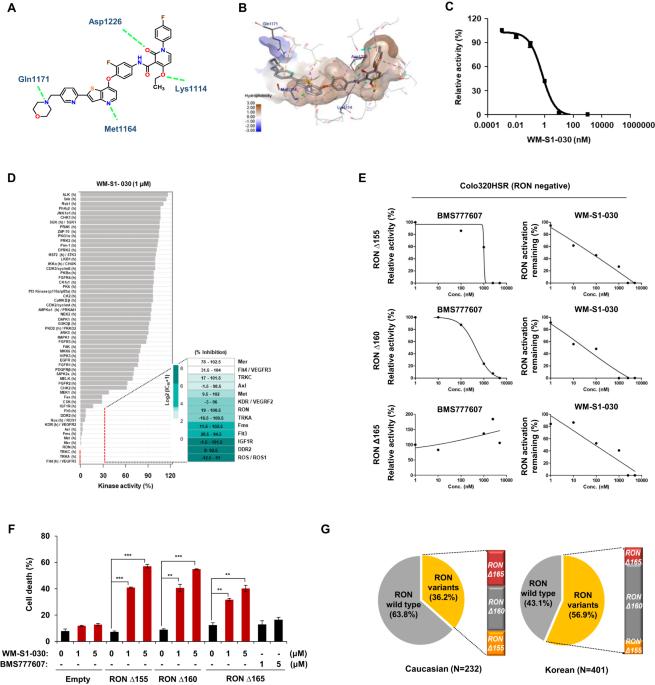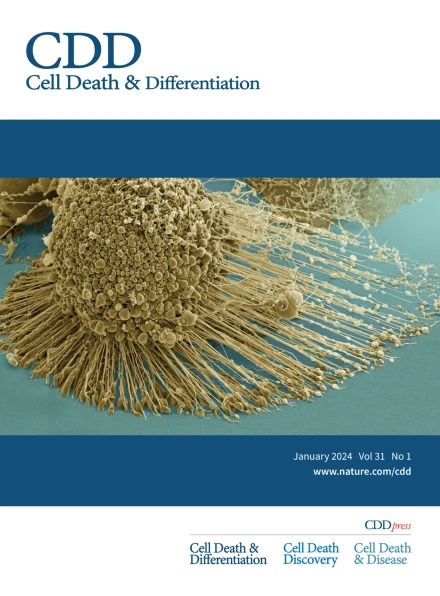Targeting isoforms of RON kinase (MST1R) drives antitumor efficacy
IF 13.7
1区 生物学
Q1 BIOCHEMISTRY & MOLECULAR BIOLOGY
引用次数: 0
Abstract
Recepteur d’origine nantais (RON, MST1R) is a single-span transmembrane receptor tyrosine kinase (RTK) aberrantly expressed in numerous cancers, including various solid tumors. How naturally occurring splicing isoforms of RON, especially those which are constitutively activated, affect tumorigenesis and therapeutic response, is largely unknown. Here, we identified that presence of activated RON could be a possible factor for the development of resistance against anti-EGFR (cetuximab) therapy in colorectal cancer patient tissues. Also, we elucidated the roles of three splicing variants of RON, RON Δ155, Δ160, and Δ165 as tumor drivers in cancer cell lines. Subsequently, we designed an inhibitor of RON, WM-S1-030, to suppress phosphorylation thereby inhibiting the activation of the three RON variants as well as the wild type. Specifically, WM-S1-030 treatment led to potent regression of tumor growth in solid tumors expressing the RON variants Δ155, Δ160, and Δ165. Two mechanisms for the RON oncogenic activity depending on KRAS genotype was evaluated in our study which include activation of EGFR and Src, in a trimeric complex, and stabilization of the beta-catenin. In terms of the immunotherapy, WM-S1-030 elicited notable antitumor immunity in anti-PD-1 resistant cell derived mouse model, likely via repression of M1/M2 polarization of macrophages. These findings suggest that WM-S1-030 could be developed as a new treatment option for cancer patients expressing these three RON variants.

RON激酶(MST1R)的靶向异构体驱动抗肿瘤功效。
受体d’origine nantais(RON,MST1R)是一种单跨跨膜受体酪氨酸激酶(RTK),在许多癌症中异常表达,包括各种实体瘤。RON的天然剪接异构体,特别是那些组成型激活的剪接异构体如何影响肿瘤发生和治疗反应,在很大程度上是未知的。在这里,我们确定活化的RON的存在可能是结直肠癌癌症患者组织中抗EGFR(西妥昔单抗)治疗耐药性发展的一个可能因素。此外,我们还阐明了RON、RONΔ155、Δ160和Δ165三种剪接变异体在癌症细胞系中作为肿瘤驱动因素的作用。随后,我们设计了一种RON抑制剂,WM-S1-030,以抑制磷酸化,从而抑制三种RON变体以及野生型的激活。具体而言,WM-S1-030治疗导致表达RON变体Δ155、Δ160和Δ165的实体瘤中肿瘤生长的有效消退。在我们的研究中评估了取决于KRAS基因型的RON致癌活性的两种机制,包括三聚体复合物中EGFR和Src的激活以及β-连环蛋白的稳定。在免疫疗法方面,WM-S1-030在抗PD-1耐药细胞衍生的小鼠模型中引发了显著的抗肿瘤免疫,可能是通过抑制巨噬细胞的M1/M2极化。这些发现表明,WM-S1-030可以被开发为表达这三种RON变体的癌症患者的新治疗选择。
本文章由计算机程序翻译,如有差异,请以英文原文为准。
求助全文
约1分钟内获得全文
求助全文
来源期刊

Cell Death and Differentiation
生物-生化与分子生物学
CiteScore
24.70
自引率
1.60%
发文量
181
审稿时长
3 months
期刊介绍:
Mission, vision and values of Cell Death & Differentiation:
To devote itself to scientific excellence in the field of cell biology, molecular biology, and biochemistry of cell death and disease.
To provide a unified forum for scientists and clinical researchers
It is committed to the rapid publication of high quality original papers relating to these subjects, together with topical, usually solicited, reviews, meeting reports, editorial correspondence and occasional commentaries on controversial and scientifically informative issues.
 求助内容:
求助内容: 应助结果提醒方式:
应助结果提醒方式:


